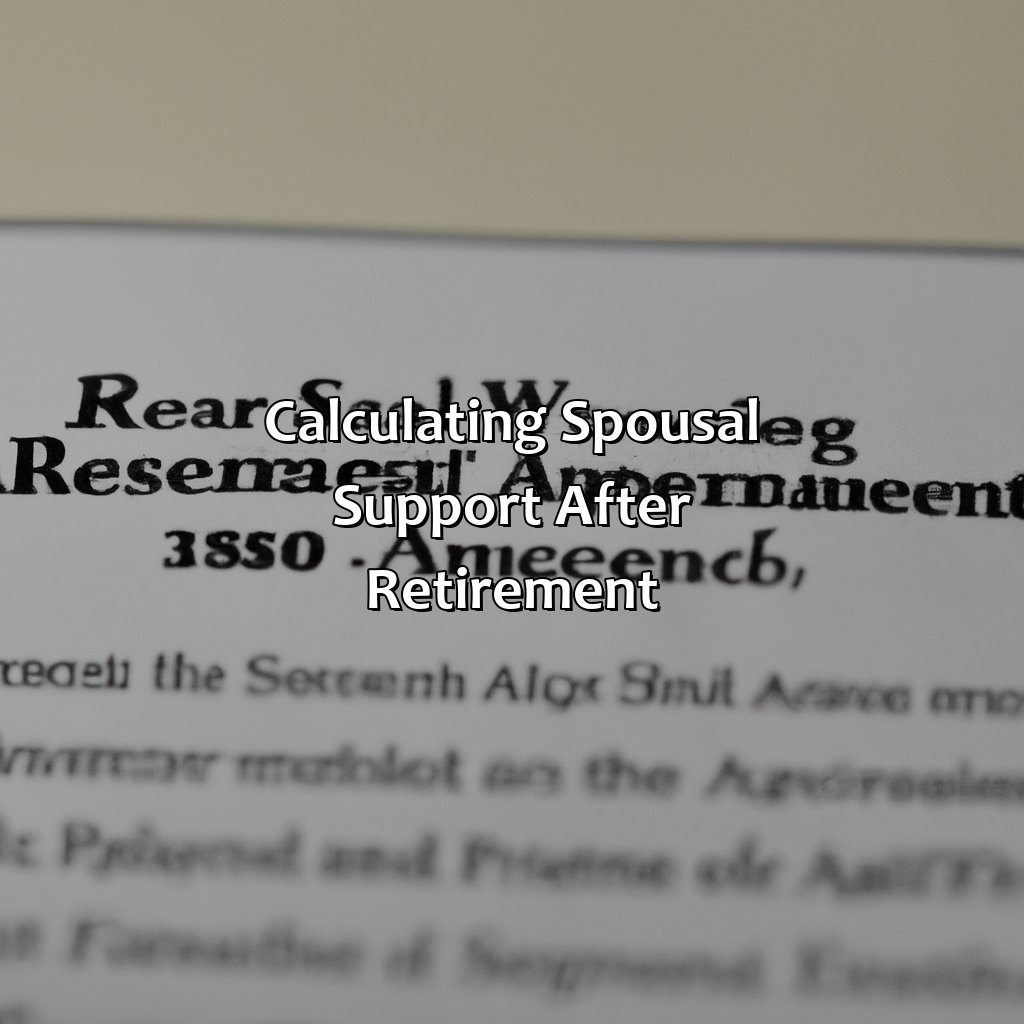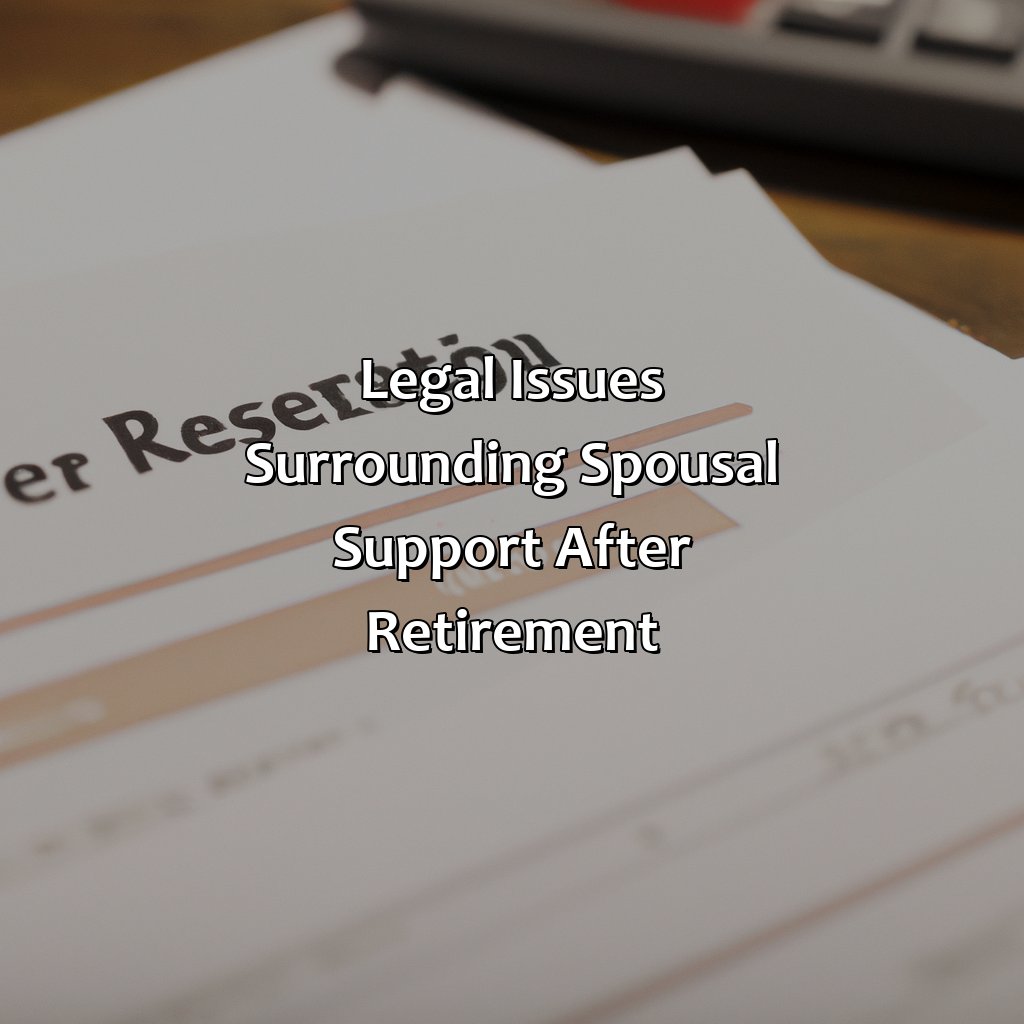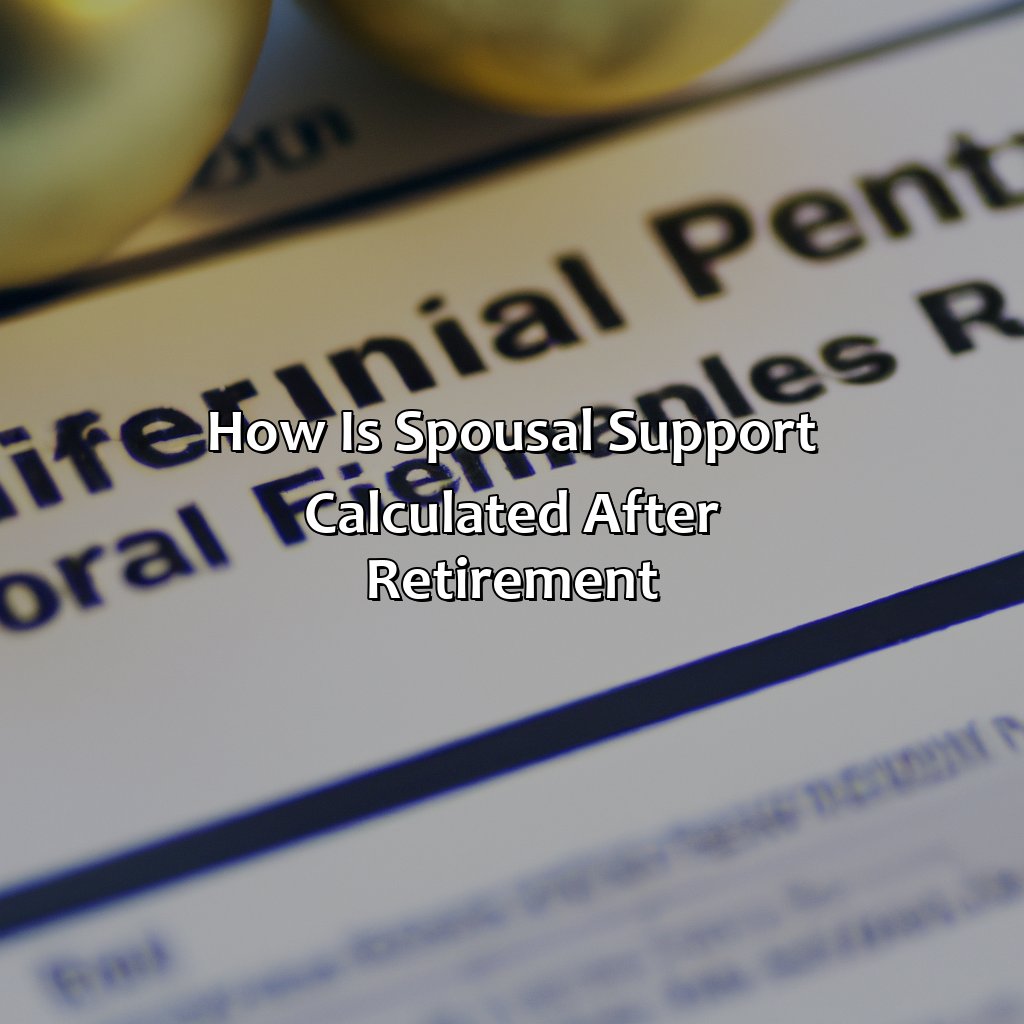How Is Spousal Support Calculated After Retirement?
Key Takeaway:
- Calculating spousal support after retirement depends on various factors, including the length of the marriage, income of both parties, and the standard of living during the marriage.
- Retirement planning is crucial in spousal support calculation, as it can impact the retirement income and financial stability of both parties.
- Changes in spousal support laws after retirement can affect the amount and duration of support payments, and enforcing spousal support can present challenges for both parties involved.
Are you approaching retirement age and concerned about how spousal support will be managed? You need to know how courts will calculate spousal support, and this article will explore the legal process. With the right information, you can feel secure during your retirement.
Calculating Spousal Support After Retirement
Calculating spousal support after retirement requires considering various factors. It is very important to plan for retirement when working out spousal support. Here, we will look at two sub-sections. The first is about the factors to consider when calculating spousal support after retirement. The second explains why retirement planning is so vital when working out spousal support.

Image credits: retiregenz.com by David Washington
Factors to Consider When Calculating Spousal Support After Retirement
When calculating spousal support after retirement, there are crucial aspects to consider in the process. These factors include income changes, duration of marriage, and health conditions. Others are age, living standards during marriage, and share of property division.
- Income Changes: Possible reduced income levels can affect the support amount
- Marriage Duration: Long marriages may demand higher support estimates than short-term ones.
- Health Conditions: Health issues of both spouses need recognition to determine obligations
- Age: An older spouse may require long-term or indefinite support due to difficulty in gaining employment/earning a consistent income.
- Living Standards During Marriage: After divorce, should each party maintain their pre-divorce lifestyle or adjust?
- Share of Property Division: Distribution of assets and debts acquired before and during the marriage could impact support payments.
It is essential to note that present legal solutions have set structures on how courts approach post-retirement spousal support determination. Consulting an attorney with vast experience is advisable to simplify the process.
To ensure a fair outcome when calculating spousal support after retirement, experts suggest considering compromises as well as being upfront about all financial metrics. Establishing clear communication about intentions will enable both parties to come up with mutual agreements that meet everyone’s needs.
Retirement planning is key, because you don’t want to be stuck paying spousal support with only social security and a burger-flipping job to rely on.
Importance of Retirement Planning in Spousal Support Calculation
If you are in the process of calculating spousal support after retirement, it is important to consider retirement planning. Proper financial planning can greatly impact the amount of spousal support payments that may be required or received. A well-planned retirement allows for informed decision-making in regards to income sources, assets, and expenses, all of which can affect spousal support calculations.
Retirement planning includes determining income sources and expenses during retirement, evaluating investment options, and reviewing pension and social security benefits. By doing this early on, you are able to have a better understanding of available funds when it comes time to calculate spousal support. This information can then be used in negotiations with your ex-partner or presented to a court when determining spousal support amounts.
It’s vital to understand how spousal support payments will affect your overall financial plan during retirement. Failure to do so could cause high levels of stress or even derail retirement plans altogether. Consider seeking advice from a financial planner who specializes in divorce-related matters for guidance.
Ultimately, effective retirement planning ensures that both parties receive fair and reasonable treatment when it comes to spousal support calculations after retirement. By proactively considering retirement needs, both parties can avoid litigation while achieving optimal outcomes based on realistic financial projections.
Retirement may mean the end of punching a clock, but it doesn’t mean the end of legal ties to your ex-spouse.
Legal Issues Surrounding Spousal Support After Retirement
Navigating legal matters of spousal support post-retirement? This article takes a deeper dive to learn more. We’ll explore the modifications to spousal support laws and the difficulties with enforcement. Get a look at how differing states address spousal support calculations. Plus, understand how retirement factors in when it comes to payment amounts.

Image credits: retiregenz.com by David Woodhock
Changes in Spousal Support Laws After Retirement
Retirement brings significant changes in spousal support laws, impacting how it is calculated. The system evaluates income differently after retirement since the pension and social security become a part of calculations. Spousal support can be modified based on changes in circumstances or needs. This modification can include termination in cases where the court determines that the recipient is financially independent without it.
When evaluating spousal support after retirement, various factors get considered, such as:
- length of the marriage
- health status of both parties
- age
- employment history and skills
- education level
- ability to return to work and earning potential
Retirement should not deprive former spouses from receiving necessary financial assistance to maintain their standard of living pre-divorce.
The modification of spousal support varies depending on the jurisdiction but may include reviews either by agreement or automatically when one party retires. No law requires automatic termination unless an existing agreement states otherwise. However, if a petition for termination gets made, the burden of proof falls on the payee to show that they are financially self-sufficient without support.
There have been cases where former spouses lose eligibility even though they negotiated to receive a specific amount at retirement. In some states such as California and Connecticut courts sometimes may not enforce agreements that continue past retirement as this creates uncertainty over payments since until someone retires income amounts are subject to change.
Spousal support during retirement demands proper planning regarding tax implications and also account for possible reduction in costs associated with children’s expenses once they become full-fledged adults or other changing circumstances over time affecting adjustment needs for payment amounts decided initially using payment formulas provided by law or determined at trial hearings while considering many crucial variables involved.
Enforcing spousal support after retirement is like trying to teach an old dog new tricks, except the dog has a lawyer and is withholding alimony payments.
Challenges in Enforcing Spousal Support After Retirement
When it comes to enforcing spousal support after retirement, there are various challenges that arise. One main issue is determining the amount of support required considering the reduced or non-existent income of the retiree. This leads to a complex calculation process based on factors such as duration of marriage, standard of living during marriage, and earning potential.
Another challenge that arises is ensuring the continuation of payments post-retirement. While some agreements may have specific provisions for this scenario, others do not, leading to disputes between ex-spouses that can only be resolved through legal intervention.
It is also important to note that renegotiating spousal support after retirement may not always be possible or favorable for both parties involved. Factors such as changes in financial circumstances and medical conditions should be considered before pursuing this option.
A story that highlights these challenges involves a retired couple who had agreed on spousal support during their divorce settlement. However, after one spouse’s retirement and subsequent reduction in income, the other spouse demanded an increase in support payments. Despite attempts at renegotiation, the ex-spouse refused and took the matter to court, resulting in increased legal fees and stress for both parties involved.
Some Facts About How Spousal Support Is Calculated After Retirement:
Spousal support can continue after retirement depending on the terms of the divorce agreement. (Source: FindLaw)
Retirement can be a substantial change in circumstances that allows for a modification of spousal support orders. (Source: LegalMatch)
The length of the marriage, the age and health of the spouses, and the standard of living during the marriage are all factors that can affect spousal support calculations. (Source: Nolo)
Social security benefits can affect spousal support calculations after retirement. (Source: The Spruce)
Consulting with a family law attorney can help ensure that spousal support arrangements after retirement are fair and equitable for both parties. (Source: Avvo)
FAQs about How Is Spousal Support Calculated After Retirement?
How is spousal support calculated after retirement?
Answer: Spousal support is calculated based on the incomes of both parties, and it can be affected by retirement. The amount of spousal support will depend on a variety of factors, including the duration of the marriage, the standard of living during the marriage, and the income and earning potential of both parties.
Does retirement automatically end spousal support?
Answer: No, retirement does not automatically end spousal support. The obligation to pay spousal support continues until the court orders otherwise. Even if the paying spouse retires, they may still be required to pay spousal support based on their retirement income.
How does retirement affect the paying spouse’s income and ability to pay spousal support?
Answer: Retirement may reduce the paying spouse’s income and ability to pay spousal support. However, it is important to remember that retirement is not an automatic justification for reducing spousal support payments. The court will consider all relevant factors, including the paying spouse’s retirement income, expenses, and financial resources.
What is the difference between permanent and temporary spousal support?
Answer: Temporary spousal support is paid during the divorce process, while permanent spousal support is paid after the divorce is final. Permanent spousal support may be modified in certain circumstances, such as the paying spouse’s retirement or a significant change in the receiving spouse’s financial circumstances.
How can I modify spousal support after retirement?
Answer: If you are the paying spouse and you have retired, you may petition the court to modify your spousal support obligation based on your reduced income and ability to pay. However, the court will consider all relevant factors and may not grant your request depending on your financial circumstances, including any retirement income or other sources of income.
What should I do if I am unable to pay spousal support after retirement?
Answer: If you are unable to pay spousal support after retirement, you should contact an attorney as soon as possible to discuss your options. You may be able to modify your spousal support obligation or negotiate a payment plan with your former spouse. It is important to take action as soon as possible to avoid legal consequences, such as being held in contempt of court for failure to pay support.
 Checkout this IRS Loophole
Checkout this IRS Loophole 




